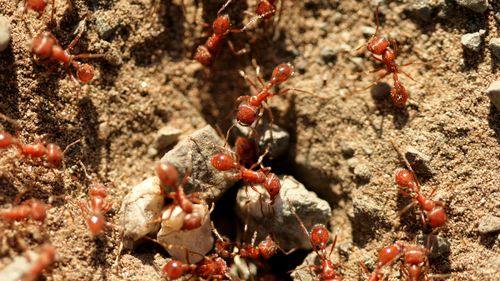Share this @internewscast.com
Experts are warning of an “alarming” development in the invasion of fire ants in Queensland.
The Invasive Species Council said the discovery of the creatures on the Sunshine Coast may be worse than previously thought.
A new nest in Baringa is close to previous nests it says, which indicates a “broader, more entrenched infestation”.

“This is alarming,” Invasive Species Council Advocacy Director Reece Pianta said.
“The increasing frequency of new detections on the Sunshine Coast suggests that fire ants may have breached the northern containment boundary, posing the threat of widespread infestation.”
Pianta called for a ”rapid surveillance blitz” to investigate, as well as more money.
“This surveillance effort should prompt an immediate national funding reassessment spearheaded by the federal government to ensure the allocation of resources is commensurate with the magnitude of the threat,” Pianta stated.
“The most recent detection comes after a series of other outbreaks in South East Queensland in recent months, many associated with building and construction sites, involving materials such as soil, mulch, and turf.
“These nests probably slipped through biosecurity zone cracks six to 12 months ago.
“Some can be traced directly back to delays in funding in 2022–23, which meant eradication activities took at least a year longer to get started compared to the southern and western borders.”
Without action, nests can start to spread.
“This is a national biosecurity emergency unfolding right in front of us,” Pianta said.
“If fire ants escape the current containment zone, they will spread across the country, devastating agriculture, threatening public health, and damaging our wildlife and way of life.”
Fire ants are native to South America but were detected in Brisbane in February 2001.
Authorities believe they hitchhiked on shipping containers from America.
The ants are two to six millimeters long and but can cause devastating environmental, economic, social and health impacts.
They can give a painful sting to humans and animals
Bites can be potentially life-threatening if a severe reaction occurs.
Typically, most people will not need medical treatment and can apply a cold compress and take an antihistamine to manage symptoms.











